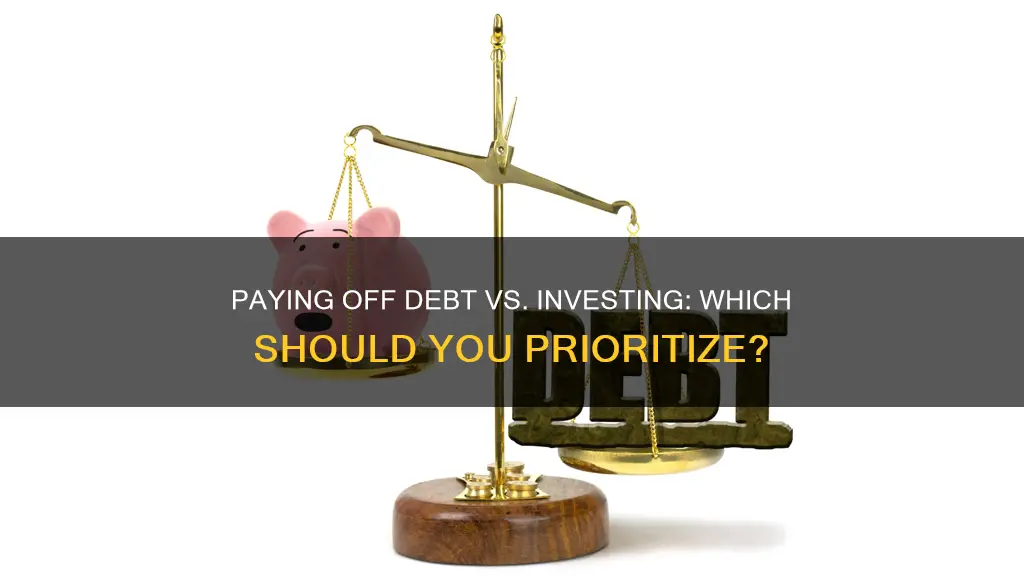
Paying off debt and investing are both important financial goals. However, deciding which to prioritise can be challenging.
A good rule of thumb is to do both: contribute to debt payoff, retirement, and an emergency fund. If you have high-interest debt, such as credit card debt, it's generally best to focus on paying that off first. Credit card interest rates are often higher than the returns you could make by investing.
On the other hand, if you have low-interest debt, such as a mortgage, you may be better off investing rather than paying off your debt faster. This is because you're likely to earn more by investing than you pay to borrow.
It's important to consider your financial goals and risk tolerance when deciding whether to pay off debt or invest.
| Characteristics | Values |
|---|---|
| General rule | It is generally better to pay off debts before investing, especially high-interest debts |
| Interest rates | Compare the interest rate on your debt with the return you expect to earn on your investments, and put the money toward the option with the higher percentage figure |
| Credit score | If you invest, you need to continue to meet the repayments on all your debts to avoid charges and damage to your credit score |
| Emergency fund | It is recommended to build up an emergency fund of at least 3 months' worth of living expenses before investing |
| Investment returns | Investment returns are not guaranteed, so if the returns you expect to make by investing are greater than the interest on your debt, it may make sense to invest instead of paying off your debts early |
| Debt type | A mortgage can be an exception to the 'pay off your debts first' rule as it is a long-term commitment priced to be paid off over the full term |
| Debt management | Debt management plans and debt consolidation can help lower the amount of interest you're paying on your debt |
What You'll Learn

Paying off high-interest debt first
Credit card interest rates in 2021 averaged about 16.65%. The lower your credit score, the higher your interest rates. If you don't pay the cards off every month, you might be closer to 30%. In contrast, while there are crazy highs and lows in the stock market, the average rate of return on stock investing over the past several decades is 8-10% a year.
Therefore, it is better to pay off high-interest credit cards, or at least lower the interest rates, before spending money on investing. This is especially true if you are losing sleep over your debts.
One way to get rates down is to get your credit score up, which means making payments on time and lowering your "utilisation rate" (how much credit you're allowed vs. how much you use).
If you are struggling to do this on your own, you may want to consider a debt management plan or debt consolidation. A debt management plan consolidates credit card debt and lowers the amount of interest you're paying on it. You make one affordable monthly payment to the agency, which distributes the money to your lenders at an agreed-upon rate that pays off the debt in 3-5 years. Your credit score improves as payments are made on time and the amount you owe shrinks.
Debt consolidation involves getting a loan with a lower interest rate and using it to pay off your credit cards. The loan can be secured, meaning you use an asset, like your house, as collateral to get a lower interest rate. Or it can be an unsecured personal loan, which has no collateral but a higher interest rate. If your debt consolidation loan has a lower interest rate than the average return on investment, you may want to start investing the money that would normally go towards paying off that high interest.
If you have the opportunity to refinance at a lower rate or take advantage of a 0% balance transfer promotion, that may impact your decision between paying off debt or investing. Either strategy will reduce your interest rate costs, which will reduce your monthly debt payments and allow you to increase your savings rate.
However, if you are investing, it's important to assess the risk to make sure you're not going to lose money. Even conservative, insured investments, such as certificates of deposit (CDs) issued by a bank or credit union, come with inflation risk. They may not earn enough over time to keep pace with the increasing cost of living.
In summary, paying off high-interest debt first is generally a good idea. This will help improve your credit score and give you more financial flexibility in the future. Once you have paid off your high-interest debt, you can start to consider investing, especially if you have a long time horizon until retirement.
Checks for Investments: When to Write
You may want to see also

Investing in the stock market
Choose how you want to invest
You have three main options when it comes to investing in the stock market:
- Human investment professional: This is a good option if you want a "do-it-for-me" solution and don't want to spend much time on investing. Human advisors typically charge a per-hour fee or a percentage of your assets annually and often have high investment minimums.
- Robo-advisor: Robo-advisors are automated programs that manage your money using algorithms. They are a more affordable option than human advisors and can handle most of your basic investing needs.
- Self-managed: If you have the knowledge or time to devote to making investing decisions, you can choose to manage your own portfolio. This option gives you the most control but also requires the most effort.
Open an investment account
Once you've decided on your investment approach, it's time to open an investment account. You have several options:
- Human financial advisor: A human advisor can design a stock portfolio and help with other wealth planning, but they usually come with high fees and investment minimums.
- Robo-advisor: Robo-advisors are typically cheaper and can handle most of your investing needs, including creating a stock portfolio that matches your risk tolerance and time horizon.
- Online broker: An online broker allows you to buy stocks and other investments, such as bonds, exchange-traded funds (ETFs), and mutual funds. Many brokers offer no-fee commissions on stocks and provide educational resources for beginners.
Decide what to invest in
If you choose to work with an advisor (human or robo), they will create a portfolio for you based on your goals and risk tolerance. If you opt for a self-managed approach, you'll need to select your own investments. You can invest in individual stocks or stock funds, which own hundreds of stocks and provide more diversification.
When choosing what to invest in, consider your risk tolerance and investment goals. If you're a beginner, it's generally recommended to take a passive, long-term approach rather than actively trading individual stocks, which can be risky.
Determine how much you can invest
The key to building wealth is to invest consistently over time and let compound interest work its magic. Decide on a percentage of your income that you can dedicate to investing and make sure you won't need the money for at least three to five years. You can start with a small amount and gradually increase your investments as you become more comfortable.
Monitor and rebalance your portfolio
Once you've made your investments, it's important to monitor and rebalance your portfolio periodically. The original allocation of your investments may shift due to market fluctuations, and you may need to adjust to stay in line with your goals and risk tolerance.
Remember, investing in the stock market can be a great way to build wealth, but it's important to do your research and understand the risks involved before diving in.
Pyramid Schemes: Why the Appeal?
You may want to see also

Credit score impact
Paying off debt can have a positive or negative impact on your credit score. While paying off debt can improve your credit score in the long run, it can also cause a temporary dip in your score.
Credit Utilization
Credit utilization, or the portion of your credit limits that you are currently using, is a significant factor in credit scores. Keeping your credit utilization below 30% can help improve your credit score. Paying off a credit card helps lower your credit utilization as your remaining balances are a smaller percentage of your overall credit limit. However, if you close the account you just paid off, you lose that account's credit limit, and your other balances represent a greater percentage of your total limit, which can lead to lower credit scores.
Length of Credit History
The length of your credit history also impacts your credit score. Credit score calculations favor longer credit histories. Paying off a loan or closing a credit card account can reduce the age of your accounts, which may negatively impact your credit score.
Credit Mix
Scores also reward you for having both installment accounts (with set payments over a specific time, like a loan) and revolving accounts (with varying payments and no set end date, such as credit cards). If you pay off your only installment loan or revolving credit account, your credit mix may be affected, potentially leading to a slight decrease in your credit score.
Impact of High-Interest Debt
High-interest debt, such as credit card debt, can significantly impact your credit score. Credit card debt can lead to high credit utilization, which can drag down your credit score. Additionally, the average interest rate on credit cards is typically above 20%, making it challenging to get ahead financially. Therefore, focusing on paying off high-interest credit card debt first can help improve your credit score over time.
Timeframe for Credit Score Improvement
If you pay off debt, you may see an improvement in your credit score within one to two months. However, it's important to remember that several factors determine your credit score, and paying off debt is just one aspect. Other factors, such as payment history, amounts owed, credit history, and new credit, also play a role in calculating your credit score.
Coastal Property: A Smart Investment?
You may want to see also

Emergency funds
Building an emergency fund is a top priority, especially if you don't already have one. An emergency fund can help you cover surprise expenses, such as a car repair, without taking on high-interest debt. It can also help you stay afloat during periods of financial distress, such as unemployment, by helping to pay monthly expenses such as rent and utilities.
However, this can be challenging, as many people live paycheck to paycheck and may not have much money left over after paying monthly bills. In addition, when you have debt, saving up several thousand dollars can feel like an impossible task.
A good rule of thumb is to aim for three to six months' worth of living expenses in your emergency fund. Start with a small, achievable goal and work your way up. For example, your initial goal could be to save $1,000 or one month's worth of living expenses.
It's important to note that you shouldn't completely deplete your emergency fund to pay off debt. Financial experts recommend maintaining at least three months' worth of expenses in your savings. For example, if your monthly expenses are $3,500, you should aim to keep at least $10,500 in your savings account.
If you're struggling to decide whether to build an emergency fund or pay off debt, consider debt consolidation. This involves merging all your debts into one fixed monthly payment with a lower annual percentage rate (APR). This can help you pay off debt faster, lower your monthly payments, and save money on interest, freeing up more money to put towards your emergency fund.
Another option is to take advantage of a 0% APR credit card, which can help you save on interest if you need to cover an unexpected cost.
Remember, it's important to find a balance between paying off debt and saving for emergencies. Don't get too hung up on emergency savings, especially if you have high-interest debt. Focus on getting rid of costly credit card debt first, as the interest rates on credit cards are usually much higher than the APY on savings accounts.
NPS: Invest Now or Miss Out
You may want to see also

Debt consolidation
Here's how debt consolidation works:
- Use the new loan to pay off your old debts.
- Pay off the new loan.
For example, let's say you have $20,000 in credit card debt spread across three different cards, each with an interest rate above 20%. You could take out a $20,000 personal loan with an interest rate of 10% and a five-year term. This would help you pay off your debt faster and save money on interest.
Additionally, debt consolidation may not address the underlying issues that led to your debt, such as overspending. It is important to develop healthy financial habits before consolidating your debt to avoid finding yourself in a deeper financial hole in the future.
There are several benefits to debt consolidation:
- Streamlined Finances: Combining multiple debts into one loan reduces the number of payments and interest rates you have to manage. It also lowers the chances of missing or making late payments, which can improve your credit score.
- Expedited Payoff: If your debt consolidation loan has a lower interest rate, you can make extra payments with the money saved each month to pay off the debt sooner and save even more on interest.
- Lower Interest Rate: If your credit score has improved, you may be able to get a lower overall interest rate, resulting in savings over the life of the loan.
- Reduced Monthly Payment: Consolidating your debt can lead to a lower overall monthly payment because future payments are spread out over a new, possibly extended, loan term.
- Improved Credit Score: Applying for a new loan may cause a temporary dip in your credit score, but debt consolidation can also improve your score over time. Paying off revolving credit lines, such as credit cards, reduces your credit utilisation rate, which ideally should be below 30%. Making consistent, on-time payments and ultimately paying off the loan can also boost your credit score.
However, there are also some drawbacks and risks associated with debt consolidation:
- Added Costs: Debt consolidation loans may come with additional fees, such as origination fees, balance transfer fees, closing costs, and annual fees.
- Higher Interest Rate: If your credit score is not high enough to access competitive rates, you may end up with a higher interest rate than your current debts, leading to higher overall costs.
- Increased Interest Payments Over Time: Even with a lower interest rate, you could still pay more interest over the life of the new loan due to the extended repayment timeline.
- Missed Payments: Missing payments on a debt consolidation loan can significantly damage your credit score and incur additional fees.
- Underlying Financial Issues: Consolidating debt does not address the financial habits that led to your current situation. Without addressing these issues, you may find yourself in deeper debt.
- Encouraged Spending: Paying off credit cards and lines of credit may create the illusion of having more money, leading to increased spending and higher balances.
When considering debt consolidation, it is essential to weigh the pros and cons carefully. Evaluate your financial situation, including your income, credit score, and existing debt obligations, to determine if debt consolidation is the right choice for you.
Congress' Stock Secrets
You may want to see also
Frequently asked questions
It is generally recommended to pay off debts, especially those with high interest, before investing. However, it is also important to invest simultaneously to secure your financial future.
If the returns on your investments are expected to be greater than the interest on your debt, it may be worth considering investing. However, investment returns are not guaranteed.
Consider the interest rate on your debt, the potential returns on your investments, your credit score, any early repayment charges, and your financial goals.







